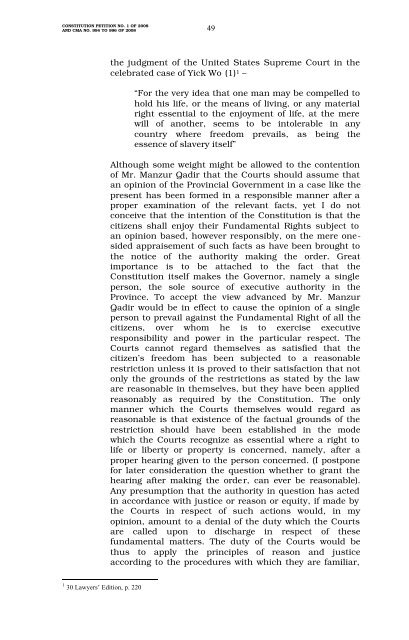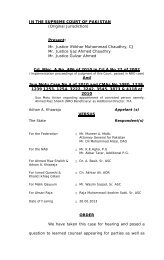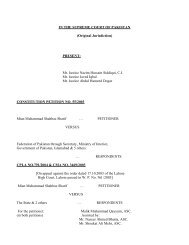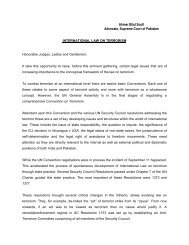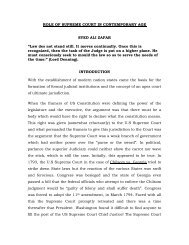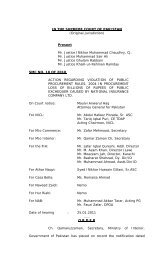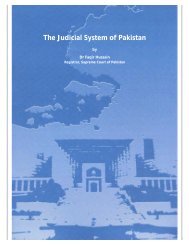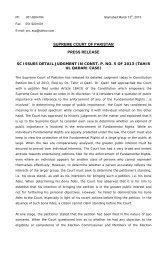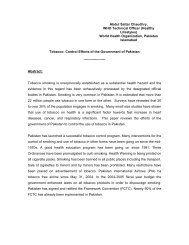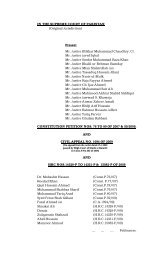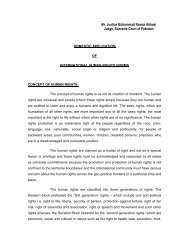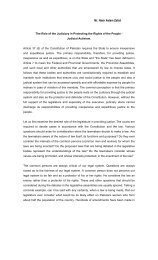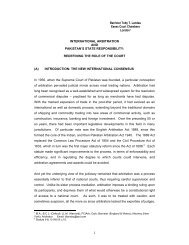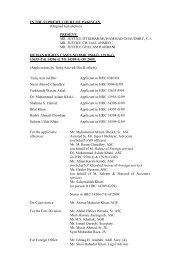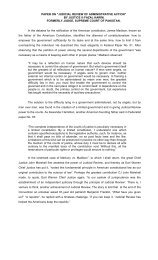MR. JUSTICE ABDUL HAMEED DOGAR, HCJ MR. JUSTICE FAQIR ...
MR. JUSTICE ABDUL HAMEED DOGAR, HCJ MR. JUSTICE FAQIR ...
MR. JUSTICE ABDUL HAMEED DOGAR, HCJ MR. JUSTICE FAQIR ...
Create successful ePaper yourself
Turn your PDF publications into a flip-book with our unique Google optimized e-Paper software.
CONSTITUTION PETITION NO. 1 OF 2008<br />
AND CMA NO. 994 TO 996 OF 2008 49<br />
the judgment of the United States Supreme Court in the<br />
celebrated case of Yick Wo (1) 1 –<br />
“For the very idea that one man may be compelled to<br />
hold his life, or the means of living, or any material<br />
right essential to the enjoyment of life, at the mere<br />
will of another, seems to be intolerable in any<br />
country where freedom prevails, as being the<br />
essence of slavery itself”<br />
Although some weight might be allowed to the contention<br />
of Mr. Manzur Qadir that the Courts should assume that<br />
an opinion of the Provincial Government in a case like the<br />
present has been formed in a responsible manner after a<br />
proper examination of the relevant facts, yet I do not<br />
conceive that the intention of the Constitution is that the<br />
citizens shall enjoy their Fundamental Rights subject to<br />
an opinion based, however responsibly, on the mere onesided<br />
appraisement of such facts as have been brought to<br />
the notice of the authority making the order. Great<br />
importance is to be attached to the fact that the<br />
Constitution itself makes the Governor, namely a single<br />
person, the sole source of executive authority in the<br />
Province. To accept the view advanced by Mr. Manzur<br />
Qadir would be in effect to cause the opinion of a single<br />
person to prevail against the Fundamental Right of all the<br />
citizens, over whom he is to exercise executive<br />
responsibility and power in the particular respect. The<br />
Courts cannot regard themselves as satisfied that the<br />
citizen’s freedom has been subjected to a reasonable<br />
restriction unless it is proved to their satisfaction that not<br />
only the grounds of the restrictions as stated by the law<br />
are reasonable in themselves, but they have been applied<br />
reasonably as required by the Constitution. The only<br />
manner which the Courts themselves would regard as<br />
reasonable is that existence of the factual grounds of the<br />
restriction should have been established in the mode<br />
which the Courts recognize as essential where a right to<br />
life or liberty or property is concerned, namely, after a<br />
proper hearing given to the person concerned. (I postpone<br />
for later consideration the question whether to grant the<br />
hearing after making the order, can ever be reasonable).<br />
Any presumption that the authority in question has acted<br />
in accordance with justice or reason or equity, if made by<br />
the Courts in respect of such actions would, in my<br />
opinion, amount to a denial of the duty which the Courts<br />
are called upon to discharge in respect of these<br />
fundamental matters. The duty of the Courts would be<br />
thus to apply the principles of reason and justice<br />
according to the procedures with which they are familiar,<br />
1 30 Lawyers’ Edition, p. 220


